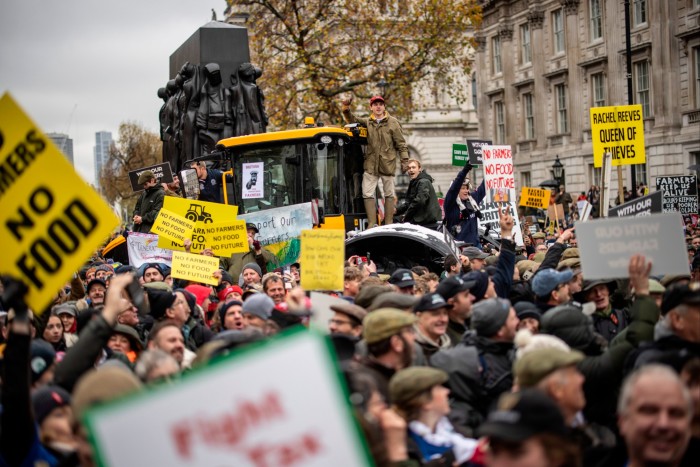Unlock the Editor’s Digest for free
Roula Khalaf, Editor of the FT, selects her favourite stories in this weekly newsletter.
The UK must urgently adopt a “strategic” approach to rural policymaking, the chair of parliament’s environment committee has said, warning of growing disaffection in farming and fishing communities across the country.
Alistair Carmichael told the Financial Times his cross-party grouping wanted to “get a bit of coherence into policy for rural communities” and help shape a better future for farming, amid criticisms from the sector of Labour’s inheritance tax reforms.
“At an official level, there is not a strategic plan for what the government wants to achieve” on rural affairs, said Carmichael, Liberal Democrat MP for Orkney and Shetland. Without a strategy, “that disaffection and that disconnection that you find in rural communities in general, but farmers in particular, is just going to continue and get worse”.
The comments by Carmichael came as farmers headed to London on Monday to stage the latest in a string of protests against reforms to inheritance tax, set out by chancellor Rachel Reeves in the Autumn Budget.
Farmers are angry about the planned changes, warning that many will have to sell their farms to pay the levy, from which they were previously exempt.
The reforms mean landowners will from April 2026 be subject to a 20 per cent levy on agricultural land above a threshold of between £1.3mn and £3mn, depending on whether they are married and if they own a home.
Carmichael, who was appointed chair of the House of Commons environment, food and rural affairs committee in September, said the IHT changes were “the catalyst that really sparked the anger . . . actually there’s been a simmering unhappiness in farming communities for a long time”.
Besides the prospect of hefty tax bills, the sector is fighting to absorb the added costs of climate change, real cuts to subsidies, high inflation, thinning margins and the possibility of increased competition as the UK strikes post-Brexit trade deals.

Environment secretary Steve Reed has faced a hostile reception from farmers at many of his public appearances since the Budget announcement, including a line of tractors attempting to block his exit from the Oxford Farming Conference last month.
In January the Office for Budget Responsibility, the fiscal watchdog, estimated the IHT policy would raise £500mn for the Treasury annually between 2027 and 2029, in line with government estimates.
Carmichael, whose constituency on Scotland’s North East coast is home to remote farming and fishing communities, said the government was expending a lot of political capital on a policy “which ultimately isn’t going to bring in much money for the Treasury”.
“My worry is that they [the government] have become a bit beleaguered,” he added, describing the Department for Environment, Food and Rural Affairs as a “cluttered landscape” made up of multiple arms-length bodies and regulators.
“It’s difficult for Steve Reed now to go anywhere in the countryside without people being angry and driving tractors.”
In the Budget, the government also announced it was accelerating the wind-down period of the old EU farm subsidies, leading to a cut in support of as much as 79 per cent this year for farmers.
The Environmental Land Management scheme, introduced by the previous Conservative government to replace EU subsidies, rewards farmers for taking part in green initiatives such as tree planting and regenerative agriculture but has been criticised for eroding food security.
“At the moment, we have got an agricultural policy that is actually taking people out of food production,” Carmichael said, adding that the committee was determined to establish a proper definition of food security. “Does it mean a greater reliance on domestic, produced food? I think it should.”
Carmichael said the government should soften its approach and consider exemptions to the policy.
“All these things are possible, but when the whole debate has been presented as a binary choice, then it just becomes unproductive.”
The government said: “Our commitment to farmers and rural communities remains steadfast.”
It added that it would “invest £5bn into farming over the next two years”, and that its policies meant “farmers will pay a reduced inheritance tax rate of 20 per cent, rather than the standard 40 per cent for other businesses, and payments can be spread over 10 years, interest-free”.












